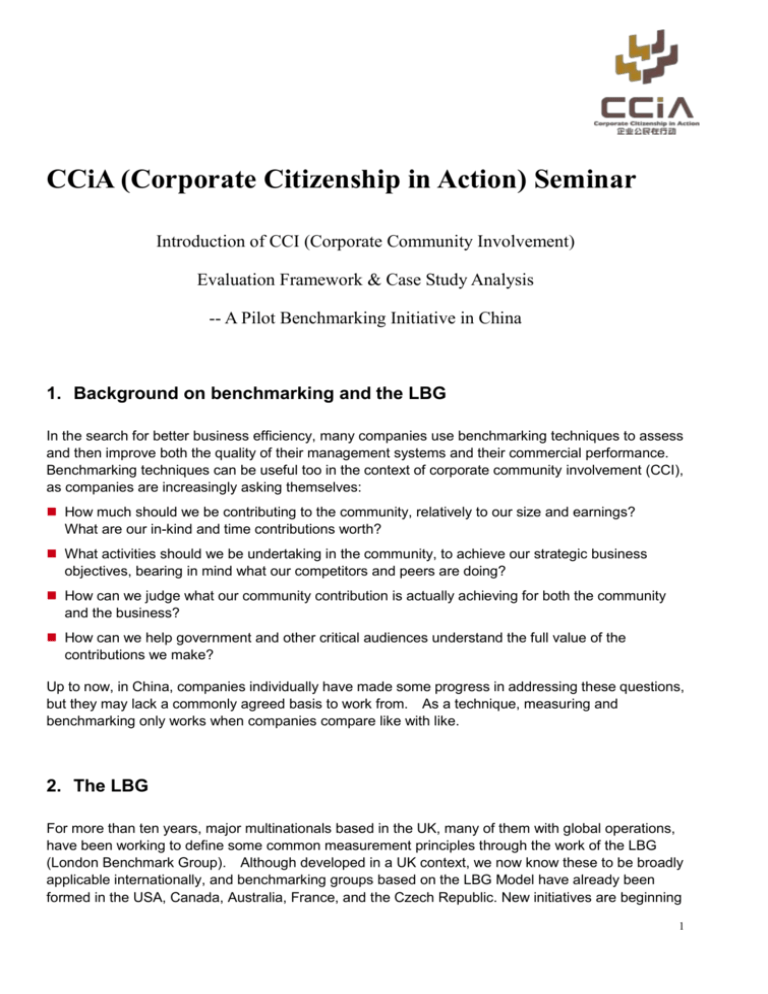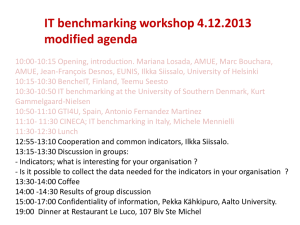CCiA Seminar EN
advertisement

CCiA (Corporate Citizenship in Action) Seminar Introduction of CCI (Corporate Community Involvement) Evaluation Framework & Case Study Analysis -- A Pilot Benchmarking Initiative in China 1. Background on benchmarking and the LBG In the search for better business efficiency, many companies use benchmarking techniques to assess and then improve both the quality of their management systems and their commercial performance. Benchmarking techniques can be useful too in the context of corporate community involvement (CCI), as companies are increasingly asking themselves: How much should we be contributing to the community, relatively to our size and earnings? What are our in-kind and time contributions worth? What activities should we be undertaking in the community, to achieve our strategic business objectives, bearing in mind what our competitors and peers are doing? How can we judge what our community contribution is actually achieving for both the community and the business? How can we help government and other critical audiences understand the full value of the contributions we make? Up to now, in China, companies individually have made some progress in addressing these questions, but they may lack a commonly agreed basis to work from. As a technique, measuring and benchmarking only works when companies compare like with like. 2. The LBG For more than ten years, major multinationals based in the UK, many of them with global operations, have been working to define some common measurement principles through the work of the LBG (London Benchmark Group). Although developed in a UK context, we now know these to be broadly applicable internationally, and benchmarking groups based on the LBG Model have already been formed in the USA, Canada, Australia, France, and the Czech Republic. New initiatives are beginning 1 in Spain and Germany, and interest is growing fast in the Asia Pacific region and Latin America. In the autumn of 2006, a first international LBG consultation was held in London, with up to 100 companies and agencies from across the globe. The key learning points from the LBG model are: defining what is and what is not CCI, with categories to distinguish between voluntary contributions (three types) and basic business expenditures; putting a full and fair monetary value on in-kind contributions, such as staff time and product donations; defining the allowable costs of managing the CCI programme. 3. Getting started in China CCiA (Corporate Citizenship in Action), has partnered with the Corporate Citizenship Company (TCCC) in UK who created and now manages LBG International, and is now taking the lead in setting up a pilot benchmarking initiative in China. The aim is to help a group of leading companies to develop and test an agreed methodology for measuring their CCI inputs, outputs and impacts spending in China. We strongly believe such an initiative will not only help participating companies to shape and improve their own CCI framework, but will also enable the ‘early pioneers’ to contribute to the broader development of corporate citizenship in China. We are contacting you because we believe you could be one such pioneer! 4. Organizational Backgrounder The Corporate Citizenship Company (TCCC): Formed in February 1997, The Corporate Citizenship Company has world-class knowledge in the management of corporate responsibility at local, national, regional and international levels. The company’s specialisms include issues research, risk assessment, ethical supply chain management evaluation through measurement and benchmarking, and reporting. TCCC also pioneered the widely-used London Benchmarking Group (LBG) methodology for measuring, recording and managing corporate community contributions, also providing advice on any aspect of companies’ community involvement programs. The company has also advised on the establishment of international Foundations The company has a senior in-house representative who is fluent Mandarin speaker with ten years of China consultancy expertise (former Chief Representative of APCO China, Liza Lort-Phillips). For more information about TCCC, please go to the website:http://www.corporate-citizenship.com/ 2 Corporate Citizenship in Action (CCiA) A newly established consulting arm affiliated to Shanghai Non-Profit Incubator, CCiA is positioned to promote the concept and practice of Corporate Citizenship in China, especially focusing on the interplay of business, NPOs and government. Her mission is to serve corporate partners and stakeholders through following approaches: 1) Promoting Corporate Community Involvement (CCI) in China, via seminar, workshops, training, website and newsletter; 2) Bridging between corporate citizens and NGO/NPOs, via stakeholder partnership research, selection, and engagement; 3) Consulting, evaluation and reporting on CSR frameworks, through capacity building, training and research Strategic Partnership between TCCC & CCiA in China Together, we believe that this partnership is in a strong position to support companies’ CSR efforts in China with, helping them to achieve “win-win situation” and develop “mutual benefit” with different groups in Chinese society. Due to a strong position and special focus of this partnership with long-term commitment, we are able to provide one-stop & tailor-made solution based on the needs and characteristics of different business entities, in the following areas: 1) Strategic advice on CSR including risk assessment, management, measurement and reporting; 2) Development of a community investment strategy that assists on all aspects of input, output and impact measurement for community programs; 3) NGO/ Stakeholders mapping and engagement in response to China’s social issues and needs; 4) Development of Corporate Employee Volunteer programmes and management; 5) Writing country CSR and sustainability reports, and developing data systems for objective analysis and assurance; 6) Consultancy on set-up and management of Corporate Foundations 3







